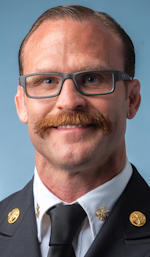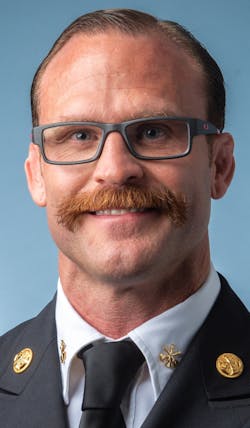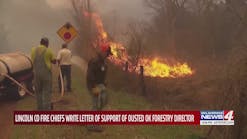What is professionalism? That is an important question to which, as a leader, I would hope you would have the answer. Let’s pause for a moment so you can define what professionalism means to you. Now that you believe you have defined professionalism, let’s look at the actual definition according to Merriam Webster: Professionalism—The conduct, aims, or qualities that characterize or mark a profession or a professional person.
That’s a rather disappointing definition because there seems to be some subjectivity to it. What is a professional person? What kind of characteristics do they have? While we could include a long list of items, I would like to focus on six specifics that are constantly relayed to me in my travels.
Organization
When I think of organization, I always go back to a quote my coach used to say repeatedly at The Citadel. He would tell us, “Organization is your greatest asset.” Of course, I didn’t understand what that meant back then, but I obviously do now. In the evolving profession we are in with the fluidity of our schedules, you must have a system you utilize for organizing your work. If you fly by the seat of your pants, I can guarantee it will eventually catch up to you. Everyone’s system is different, but the people who have a system they stick with are the ones who remain successful throughout their careers.
Be the example
Now this is rather cliché because we hear it all the time from people who say one thing but do the total opposite. How about this one? An officer who tells his/her crew to ensure they can throw a ladder, but they can’t even do it themselves. Or an officer who wants everyone else to do the work but has never actually done any work themselves. They were just lucky to get promoted and as soon as they did, it was time to make everyone else perform the work. So, what does “be the example” really mean? Take a look.
- Make sure your uniform looks crisp
- Shine your shoes
- Shave
- Have a clean haircut
- Exercise
- Eat healthy
- Have good eye contact
- Provide a strong handshake
- Articulate your message without an attitude
- Check your ego. If you say “I” about something that is the department, read #10 again
Stop talking about your teammates
Now, this is probably the one that other leaders ask how to fix more than any. I’m going to remind you of a quote from former First Lady Eleanor Roosevelt. She states, “Great minds discuss ideas; average minds discuss events; small minds discuss people.” Sad but true in many cases. You have a team in your organization but why do you think it’s important to talk about everyone else? Do you realize how much time you waste doing this? While you’re talking about someone else, there’s others in your organization running circles around you with their work production and just genuine love for the job. Oh, and if that’s not enough to get your mind right, how about this one: “Winners focus on winning; losers focus on winners.” I bet that got your attention.
Be nice
Being nice should not be confused with being a weak leader. So please, do not mistake kindness for weakness. If you think you need to yell or possess a tough persona to be a leader, I think you may have missed an important chapter in your leadership book. I have met a lot of leaders with tough attitudes and egos and they, unfortunately, just don’t see the bigger picture. I have also met a larger number of leaders who speak kindly to everyone and just treat others with respect. Really and truly, being nice is being respectful. Yes sir, yes ma’am, no sir, no ma’am. Is it really that hard to do this?
Leave emotion out of it
One thing I learned when I was a MMA fighter was that you need to leave your emotion out of the fight. Once you get emotional, you start flailing punches and kicks so hard that you gas yourself out. The same can be said for our profession. When you are discussing an important topic, you must leave the emotion out of the conversation. I know at times this is difficult, however, it’s a necessity because once emotion is thrown into the equation, things are said that can’t be taken back. As a leader, you must have composure at all costs. Find that poker face and practice it over and over again until it becomes habit. You can’t let someone rile you up so much to where your knowledge is forgotten because you lost your cool. Take a deep breath and move on. Whatever it is, it could always be worse. Let it go.
Reliability
As a professional, it is essential to be reliable, especially in what we do. Be early. Do quality work. Do what you say you’re going to do in a timely manner. Remember your happiness is not always what’s best for the team. If you don’t like to participate in certain team events, learn to like it. To be a team player means to step up to the plate even when it’s something you don’t want to do. If you’re not willing to do that much, you’re not even reliable enough to be on a team.
Now, granted these are only six characteristics of being a professional, but they are six important ones I see from my travels in teaching leadership. The same ones are brought up repeatedly in classes. Remember, there is no perfect recipe or magic formula to be a great leader who possesses a high level of professionalism. It takes hard work, dedication, self-awareness and the ability to remain poised at all times. Is this difficult? Yes, of course. However, you really don’t have a choice on this one. If you expect your people to be professional, you better be as well. If not, how do you expect your organization to be viewed as professional? Chew on that for a bit and see what you come up with.

Dr. David Griffin
Dr. David Griffin is the assistant chief of administration in Charleston, SC. He was the operator of the first-due engine on June 18, 2007, when nine of his fellow firefighters perished. Griffin has come through the ranks in operations in every uniformed position, from firefighter to battalion chief and shift commander to his current position, during his 19-year career in Charleston. He has a bachelor's degree in education from The Citadel, a master's degree in executive fire service leadership, and a doctorate of education in organizational leadership and development. Griffin is the author of "In Honor of The Charleston 9: A Study of Change Following Tragedy," among three other books. He is an international speaker and instructor, a certified Chief Fire Officer and Chief Training Officer with The Center for Public Safety Excellence, an IFSAC/Pro Board-certified Fire Officer IV and a graduate of the Executive Fire Officer Program from the National Fire Academy. He is a graduate of Harvard University's Kennedy School of Executive Education program: Senior Executives in State and Local Government and of the Psychology of Leadership program at Cornell University's SC Johnson College of Business. Griffin is the owner of On A Mission, LLC, at drdavidgriffin.com.






